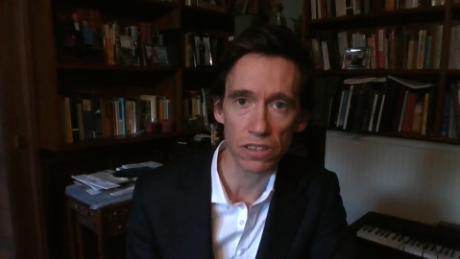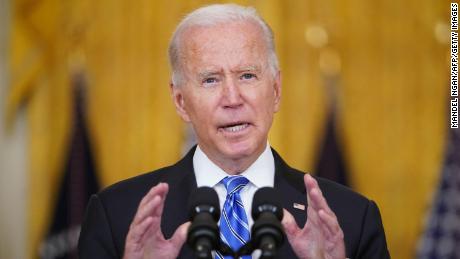(CNN)Mizgon Darby was an 18-year-old college freshman when she started a journal 20 years ago giving voice to the growing numbers of Afghans living in the United States.
"There was a sense of hope, of wanting to help, and wanting to do more and do better and go back to the country, and this sentiment of belonging and being both Afghan and American," said Darby, now 38 and the executive director of an educational program in the San Francisco Bay area.
But that sense of rebuilding their fractured country is rapidly fading as provincial capital after provincial capital in Afghanistan falls to the Taliban decades after their regime collapsed at the hands of the US military and Afghan opponents.
"It's the complete reverse now," Darby said. "The Afghanistan that those in the diaspora, especially those in Fremont, had hoped for is no longer."
The San Francisco Bay area is home to about 60,000 Afghan immigrants, the largest concentration in the cities of Hayward and Fremont, where the climate, the surrounding mountains and a strip of small businesses and Aghan social organizations known as Little Kabul reminds them of their native land.
"The whole community is frustrated," said Rona Popal, 63, executive director of the Afghan Coalition, a community organization.
"They're very mad. They are confused. They're mad not only at the United States but also at the Afghans themselves, those leaders who are sitting in the government with the power and are still talking about 'we're going to fight' and every day you see the Taliban coming."
'They've got to fight for themselves'
As expatriates on the streets of Fremont speak of American betrayal, the Taliban -- more than 7,000 miles away -- on Saturday claimed to have captured more of Afghanistan's 34 provincial capitals on its march to the Kabul.
Mazar-i-Sharif, the most important city in the north of Afghanistan, fell to the Taliban Saturday after government forces suddenly left the city and headed toward the Uzbekistan border, according to sources in the city.
The fall of Mazar-i-Sharif, the capital of Balkh province, means the Taliban now control 22 provincial capitals. Only two major cities -- Kabul and Jalalabad -- remain in the government's control.
In Washington, President Joe Biden has defended his decision to end the war in Afghanistan, insisting no amount of sustained American presence there could resolve the country's problems.
Biden said US troops will be done with the military mission by the end of this month. After dismantling al Qaeda in the country and killing Osama bin Laden, Biden said the military mission had been accomplished.
"They've got to fight for themselves, fight for their nation," Biden said this week, referring to the Afghan government. "They've got to want to fight."
In a statement Saturday, Biden announced the deployment of an additional 1,000 troops to Afghanistan "to make sure we can have an orderly and safe drawdown of US personnel and other allied personnel and an orderly and safe evacuation of Afghans who helped our troops during our mission and those at special risk from the Taliban advance."
Fear of a full-blown civil war back home
"We have been displaced permanently," said Darby, who was born in the US and whose first language was Dari, the Afghan dialect of Farsi.
"There is no going back to the country where our parents were born and raised. Or being able to provide services or assistance and watch children grow and do things there that would help society as a whole."
Many expatriates fear the collapse of the Afghan government and full-blown civil war back home. They worry about Afghanistan again becoming a haven for terrorists bent on attacking the United States.
"We shouldn't fool ourselves and say that we won this 'forever war,'" said Darby, referring to the long conflict that has claimed tens of thousands of Afghans and thousands of US troops.
And civilian casualties in Afghanistan reached record levels in the first half of 2021, according to the United Nations, noting that deaths and injuries spiked markedly from May when the United States and its allies began withdrawing troops from the country.
Some 5,183 casualties were recorded in the first six months of the year -- a 47% increase from 2020 -- the United Nations Assistance Mission in Afghanistan (UNAMA) said in a report.
"We have created a breeding ground for terrorists and a place where 15-year-old girls will be mandated by the Taliban to marry their troops," Darby said. "I feel like we've been put in a time machine and taken back."
She said her father, who is in his late 70s and left Afghanistan at the beginning of the 1979 Soviet invasion, refuses to discuss the latest round of turbulence back home.
"There's a sense of mourning in Fremont right now," she said. "Some of our elders, like for example my father, won't even talk about it. I brought it up with him several times and he changes the topic. He's heartbroken."
A new wave of refugees could come soon
Most of the Afghan refugees who settled in the Bay Area began arriving there after the Soviet invasion.
A new wave could come soon. The first group of translators and interpreters who helped US soldiers and diplomats in Afghanistan arrived in the US late last month, and thousands more wait in Afghanistan in fear of Taliban reprisals.
"A lot of these people, we've seen them end up homeless in the beginning," Darby said. "We've seen them basically travel from home to home -- pregnant wives and husbands who are disabled. It's a difficult living for them. It's not like we have the infrastructure, even here in the United States, to support this."
Popal, a longtime Afghan women's activist who has been in the US 43 years, said she moved to Fremont in the 1980s mostly because it was an affordable place to live. That's no longer the case.
"Rent is so expensive now -- $2,500 to $3,000," she said. "How are they going to afford it? When they bring these translators they usually give them rent money for six months and then they put them on the street and say, 'Go, you do it yourself.' All these translators, after six months, they come to our office and say, 'What should I do?'"
'Now there's a sense of homelessness'
Farid Younos, a retired professor at Cal State East Bay in Hayward who considers himself both Afghan and American, traveled to Austria this weekend to give a presentation on the situation in Afghanistan.
Younos said the blame for a Taliban takeover of Afghanistan will fall mostly on Biden's shoulders for his decision to bring all US troops home. But blame will also fall on what he called a "corrupt" government in Afghanistan that has largely ignored the role of Islam in that nation.
"That has been very costly for Afghanistan," he said. "In that country, you can't ignore Islam if they want to have peace. Islam is very much compatible with democracy but based on some principles of morality and ethics. But Islam cannot be imposed."
He added, "Afghanistan is a country of freedom and freedom of the press and freedom for women. We have practiced democracy in the past. So this radicalism does not have any place in Afghanistan."
Younos warned that a return of the Taliban will not only affect Afghanistan but also the entire Middle East, Central Asia and eventually Europe and beyond.
Waheed Momand, one of the cofounders of the Afghan Coalition in Fremont, is in constant communication with representatives of political parties, social and cultural organizations, tribal councils, religious leaders, academics and others in Afghanistan. The goal reaching a peace deal that brings an end to the bloodshed. An international virtual conference of group representatives is scheduled for next month.
American troops "left Afghanistan in the middle of the night," said Momand, president of the Fremont-based Grand National Movement of Afghanistan, which is pushing for a negotiated end to the conflict. "So the Taliban is claiming victory. Sure, they can say this is a victory. But it's not about the Taliban. It's not about the Afghan government. It's about the people of Afghanistan. What's going to happen to those 20 years of progress in Afghanistan?"
Darby recalled the hate and discrimination aimed at Afghans in Fremont after the 9/11 attacks two decades ago. Now the Afghans in the San Francisco Bay Area, she said, are being called terrorists, unpatriotic and un-American for speaking out against the US troop withdrawal.
"There was that sense of being homeless before, post 9/11, where the Afghan community felt that those in America did not accept us as much because we were targeted as terrorists," she said.
"Now there's a sense of homelessness because we know that the country of our birth or the country that our parents were born in ... is completely different than what we heard in stories from our families. And I don't know what's worse."
Correction: An earlier version of this story gave the incorrect number of additional troops being deployed to Afghanistan. That number is 1,000.
"in" - Google News
August 15, 2021 at 05:46AM
https://ift.tt/3iIk75s
In the largest Afghan enclave in the US, frustration, heartbreak and 'a sense of mourning' - CNN
"in" - Google News
https://ift.tt/2MLa3Y1
https://ift.tt/2YrnuUx
Bagikan Berita Ini


















0 Response to "In the largest Afghan enclave in the US, frustration, heartbreak and 'a sense of mourning' - CNN"
Post a Comment